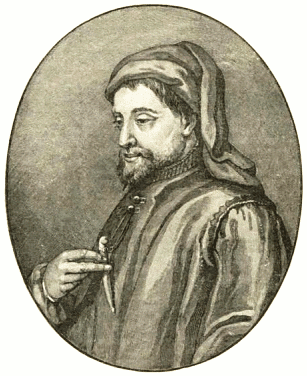In order to study the Chaucer’s Time through the inputs of history and Chaucer’s own career are worth taking. It cannot be denied that except rich patronage he would not be able to compose such a multitude in his tumultuous years.
It is worth remembering – what would not be guessed from a study of Chaucer’s writing – that the period in which he lived was a Time of Rapid Change and Events of Confusion. The growing tendency for the commutation of labor service for money – payment combined with the result of the Black Death to cause the decay of villeinage and to increase the independence of the Laborers, who, left small in number by the ravages of the plague, were able to set their own price on their labor. In vain the governing class tried to stop the rise in laborers ‘wages by statutes of laborers’.
The clock not is put back, and the results of the Black Death in depopulating the countryside put the laborers in an extremely favorable position. Villeins slipped away from the land to which they were legally bound, to offer their services to the highest bidder. With harvests rotting for lack of workers, landowners were forced to pay in wages what was asked. In addition to the unrest produced by this problem, there were many other causes for general dissatisfaction in the last years of Edward III‘s reign and the beginning of Richard II’s. England was being governed by a selfish and Corrupt Clique; France was slipping away from her control and her supremacy at sea being steadily destroyed; the glory of Crecy and Poitiers had departed and – worst of all – the country was being taxed almost out of existence in a vain endeavour to win back the last power and glory. English commerce depended largely on the maintenance of English sea – power, and the revival of French might by land and sea was more than a military question. Amid this general discontent the Peasants’ Revolt broke out in 1331. Change was in the air, and to a contemporary it might well have seemed to be decay.
 |
| Geoffrey Chaucer |
Chaucer’s Political Career: 1359= Joins the Army: Chaucer fights in the English Army in Hundred Years' War
Jun 20, 1367=Becomes a Member of Court: Chaucer becomes a member of the royal court as a valet to King Edward III.
1369=Begins Book of the Duchess: Chaucer begins work on the Book of the Duchess, an elegy for noblewoman Blanche of Lancaster that is commissioned by her husband. It is completed by 1374, when her widower John of Gaunt pays Chaucer for the book.
1370=Second Tour of Duty: Chaucer completes his second tour in the English Army, after spending one year fighting in France under John of Gaunt.
1373= Travels to Italy: Chaucer visits Genoa and Florence. He reads Italian medieval poetry, an influence on his own creative work.
Jun 8, 1374=Becomes Comptroller: Chaucer is appointed to the lucrative job of Comptroller of Customs for the Port of London. In the twelve years during which he holds this position, he writes most of his poetic works.
1377=Change of Kings: King Edward III dies. His grandson Richard II takes the throne. He is the nephew of Chaucer's political patron, John of Gaunt, which is good news for Chaucer's career.
1385=Justice of the Peace: Chaucer takes a four-year position as a Justice of the Peace in Kent, where he now resides.
1386=Joins Parliament, Writes Poem: Geoffrey Chaucer resigns as Comptroller and becomes a member of Parliament, representing Kent. He also begins work on The Legend of Good Women, a poem completed between 1386 and 1388.
Jul 12, 1389=Receives Royal Appointment: Chaucer is appointed Clerk of the King's Works, a job akin to chief overseer for all royal building projects. In this capacity, he oversees jobs at the Tower of London, Westminster Palace, Windsor Castle, and St. George's Chapel.
Jun 1391=Changes Jobs: Chaucer leaves the King's Works job and begins working as a Deputy Forester in the royal forest of North Petherton.
Key Points:
- Geoffrey Chaucer was a poet and diplomat who lived in England during the 14th century.
- He served in a number of political positions, including Clerk of the King's Works and Ambassador to Italy.
- His political career motivated his writing, and he often used his work to comment on the political events of his time.
- Some of his most famous works, such as The Canterbury Tales, are full of political allegory and satire.
- Chaucer's political career gave him a unique perspective on the world, and he used his writing to share his insights with others.
- He was a keen observer of human nature, and he often used his work to explore the themes of power, corruption, and social justice.
- Chaucer's writing is still relevant today, and it continues to offer insights into the human condition.
References
An outline history of English literature : Hudson, William Henry, 1862-1918 : Free Download, Borrow, and Streaming : Internet Archive. (n.d.). Internet Archive. https://archive.org/details/outlinehistoryof00hudsuoft

Comments
Post a Comment
Drop any query, suggestion or comment here.